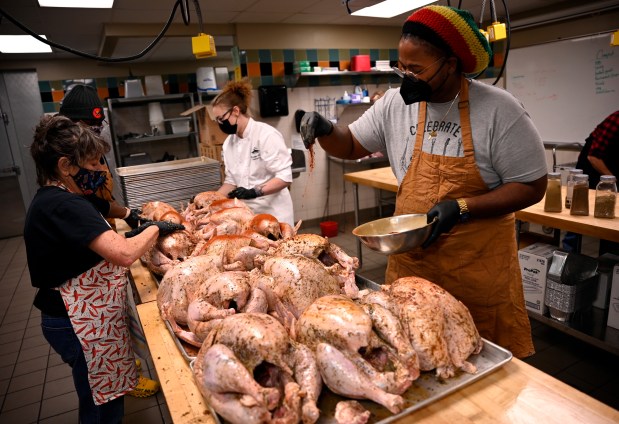By JOE RUBINO | jrubino@denverpost.com | The Denver PostNovember 30, 2021
25-acre former college in South Park Hill hosting culinary programs, K-8 school, affordable housing up next
Five months after Denver Public Schools, the Denver Housing Authority and nonprofit Urban Land Conservancy teamed to buy the 25-acre Johnson & Wales University property in northeast Denver, change is starting.
A pair of affordable housing projects are in the planning stages for the former dorm buildings on the property, located at 7150 Montview Blvd. A major expansion of the Denver School of the Arts on the campus’ west side also is on deck. That project is expected to allow the school to grow by between 500 and 700 students and prioritize students of color and low-income families, officials said when the sale closed in June.
The work follows pledges from Johnson & Wales representatives last year that the university would prioritize buyers dedicated to supporting the surrounding neighborhood.
Even before construction crews get started on those projects, new public benefits are starting on the historic property.
Jorge de la Torre, formerly the dean of the culinary program at Johnson & Wales, joined nonprofit shared kitchen and food business incubator Kitchen Network when that organization opened a location on the campus this summer.
Kitchen Network in turn brought in organizations including Work Options, a nonprofit job training program focused on helping people with criminal records and those who are homeless develop kitchen skills, and starting an apprenticeship program with the Rocky Mountain Chefs of Colorado. Partnerships with more than a half-dozen other nonprofits and local restaurant companies are also in place and a 24-hour commissary kitchen is expected to open on the campus early next year, de la Torre said.
“The silver lining is (the campus) just gets a second life to be available to people who may not have been able to afford a Johnson & Wales education,” he said. “We can just reach a larger population.”
Erick Garcia, Kitchen Network’s chief operating officer, said the nonprofit has 150 monthly active users and helped launch more than 60 new businesses this year, as of November. With its Park Hill location, Garcia hopes to triple those numbers over the next five years, reaching a new well of clients on the east side of the city, many of them Spanish-speaking.


Across from the culinary arts building, the campus’ historic Centennial Hall is providing St. Elizabeth’s School with room to grow.
The K-8 private Episcopal school, with 140 students, now has the space to double in size, director of finance and operations Kim Johnson said. Part of the school’s mission is to be “intentionally inclusive.” Its student body is 49% students of color and 83% of students get discounted tuition. School leadership saw the Park Hill campus as an opportunity to work alongside organizations with similar values and goals, Johnson said.
Preserving history, providing opportunity
Centennial Hall was completed in 1908 when the campus debuted as Colorado Women’s College, according to Historic Denver. It and the other buildings are part of the landscape and the culture of the greater Park Hill area, said Denver City Councilwoman Robin Kniech, who lives about a mile away from the campus.
Seeing DPS, the housing authority and the Urban Land Conservancy come together and be able to pull off the acquisition was both a pleasant surprise and very reassuring, she said.
On the opposite side of Denver, for-profit development firm Westside Investment Partners is also working on historic reuse and affordable housing projects at the former Loretto Heights college campus on Federal Boulevard, but Kniech said the city had to push for affordability there. In Park Hill, creating affordable housing is a core mission of two of the new owners.
“I believe that our (Park Hill) community recognizes the importance of being able to bring together preservation of historic buildings and preservation of affordable housing options in our city,” Kniech said.
Focus on housing
It may be a while before people can move into the planned affordable apartments.
The Denver Housing Authority views the two dorm buildings it acquired on the property’s south side as an opportunity for “really quick housing,” spokeswoman Keo Fraizer said. Some of the 72 units already have kitchens and private bathrooms. But work is needed and the agency is focused on preserving the historic elements of the building. The agency doesn’t have a timeline for when it expects to open, Fraizer said.
Nonprofit developer Archway Communities cleared an important hurdle earlier this month in its efforts to transform about 400 dorm rooms on the northeast side of the campus into affordable apartments. The Colorado Housing and Finance Authority awarded the project a combined $2.9 million in competitive state and federal tax credits to help fund the work.
Archway plans to tap into historic preservation tax credits and other financing for what is expected to be a roughly $45 million project, president and CEO Sebastian Corradino said. When work is completed — ideally sometime in early 2024 — the four buildings Archway is under contract to buy from the Urban Land Conservancy will be turned into more than 150 subsidized apartments, at least 10 of which will be available to families making 30% or less of the area median income. Using 2021 income figures, that would cap the rent for a three-bedroom apartment at $817 a month for qualified low-income families.
Urban Land Conservancy has urged Archway to build more two- and three-bedroom apartments in the project than it normally would, which speaks to the nonprofit’s commitment to serving working families in nearby neighborhoods, Corradino said.
Loan fund was key
During a recent walk through the property, Urban Land Conservancy CEO Aaron Miripol said he never thought the nonprofit would buy a whole university campus. A lot of things had to go right.
There was a willing seller in Johnson & Wales. Then DPS first expressed interest in the campus and reached out to Urban Land Conservancy about making an offer. The school district put up $30 million of the $62.2 million needed to close the deal, according to the conservancy.
An important part of the story was the large pot of money at Urban Land Conservancy’s fingertips that allowed it to make a move within weeks and keep up with the commercial developers trying to acquire the property, Miripol said.
The conservancy is the sole borrower with access to the Metro Denver Impact Facility, a low-interest loan fund seeded with $25 million from FirstBank in 2018. With support from junior lenders including Gates Family Foundation and the Colorado Health Foundation, the fund grew to $50 million and allowed the nonprofit to make nine purchases, preserving affordable space for nonprofits, schools and housing. In the Johnson & Wales deal, $19.5 million came from that fund.
“I think it shows that the nonprofit sector can do these types of things,” Miripol said.
Miripol is hopeful that the Metro Denver Impact Facility will grow in the future to make more large-scale like the Johnson & Wales purchase possible.
Amber Hills, FirstBank’s president for the southwest market, wrote in an email that FirstBank “shares Aaron’s aspirations that this fund will reach $75 million.”
Urban Land Conservancy vice president Erin Clark is still working on legal frameworks and permits for the campus. But in September she and others involved in the complicated purchase were able to sit back and enjoy a 1,000-person block party on the property, something Clark said Urban Land Conservancy hopes to host every year.
The conservancy has other ideas in mind, including a farmers’ market on the quad, free live performances from DSA students and other activities designed to invite neighbors onto the grounds, Clark said. One of the next big steps in integrating with greater Park Hill is renaming the campus. A consultant is gathering input for that.
“This is about preservation of buildings, preservation of open space, but also the preservation of a feeling within a community and preservation of opportunity,” Clark said.

